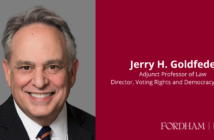A discussion with three Fordham Law professors about environmental law
The United Nations climate change conference in Paris this past December spurred many nations and their residents to consider more carefully their impact on the environment. At Fordham Law, professors who teach, research, and write about environmental law are continually thinking about the many ways the legal system approaches the stewardship of our planet. Fordham Lawyer sat down with three professors—Sheila Foster, Paolo Galizzi, and Nicholas Johnson—and learned how the environment affects the economy, social justice issues, and other aspects of our daily lives.
How are legal professionals and law professors shaping the current conversation about the environment and environmental law?
Johnson: In some sense, they shape it in the same way that lawyers have always been participating in this process: as representatives of clients who have particular interests. The other place, though, where you see lawyers in the background is in policymaking and impressing on the kind of public law issues that people will read about in The New York Times.
Galizzi: At the international level, lawyers play a critical role in the negotiation of international agreements that address global problems, such as climate change, the growing crisis surrounding wildlife, and the loss of biodiversity. I think lawyers—including academics, private practitioners, and diplomats—try to influence the conversation around these issues.
Foster: Traditionally, lawyers were helping to make environmental law. Now there’s arguably less lawmaking; there hasn’t been a new environmental law at the federal level in more than two decades. I think the state and local levels are different. Notably, mayors and local leaders are taking the lead—on climate change in particular.
Why has there been little new law at the federal level?
 Foster: The laws in the 1970s, and the amendments later in the 1990s, accomplished a lot and consequently left a lot for agencies to implement. We have these major environmental statutes with arguably broad reach. The question is how we interpret those to cover particular problems. Many of our environmental laws are geared toward industry: controlling industry and industrial sources—what we call point sources. In fact, as we know from everyday use—from what we consume and what we throw away—there’s a lot of pollution from our daily activities that isn’t captured in the way in which environmental law conceives of point sources and how pollution gets into the environment. That’s a persistent problem in environmental law, particularly in regard to water pollution.
Foster: The laws in the 1970s, and the amendments later in the 1990s, accomplished a lot and consequently left a lot for agencies to implement. We have these major environmental statutes with arguably broad reach. The question is how we interpret those to cover particular problems. Many of our environmental laws are geared toward industry: controlling industry and industrial sources—what we call point sources. In fact, as we know from everyday use—from what we consume and what we throw away—there’s a lot of pollution from our daily activities that isn’t captured in the way in which environmental law conceives of point sources and how pollution gets into the environment. That’s a persistent problem in environmental law, particularly in regard to water pollution.
Johnson: The early successes of the major federal statutes dealt with some of the easier problems. For example, our rivers are not on fire today. We still, however, have major problems dealing with nonpoint-source pollution—basically, rain runoff—under the Clean Water Act. There is not a good model for resolving that problem. You really need massive land use regulation in order to deal with it. That’s traditionally been a local zoning issue. The question of whether there’s any work viable at the federal level to resolve that problem I think is an open question. Some people say, “That’s not something that Congress can solve.”
How is environmental law shaped at the international level? What did the climate summit in Paris accomplish?
Galizzi: The positive thing was that there was an agreement. After many years during which the international community failed to reach a consensus, now there is a text that we can start working from. The provisions in the agreement are not as strong as many would have wanted, but it’s a compromise among 194 nations. It’s a starting point. The agreement has mechanisms built in to ensure there is a constant revision of the commitments that parties have made to see that we’re actually making progress in fighting climate change.
These agreements are supposed to enter into force by 2020, and then every five years there will be a revision of the commitments to make sure that the goals that have been established are achieved and also to see whether stricter measures need to be implemented. One of the weaknesses of this agreement is that it relies very much on action taken at the domestic level. There’s a lot in this agreement that depends on domestic legislation or domestic action that the international community has essentially no control over. What the United States decides to do or not is completely outside the jurisdiction of the United Nations; if the United States fails to implement its obligation, then the whole thing falls apart.
For example, the agreement was built on the premise that the Obama administration regulation of power plants would stand. Now that the U.S. Supreme Court has suspended the application of those regulations, there’s a lot of debate on whether the Paris agreement is going to survive.
Foster: At the national level, you couldn’t imagine us trying to get all the states to agree to control point-source pollution or any other environmental problem without the federal government telling the states what to do.
Because that kind of body doesn’t exist at the international level, there is a real collective action problem. Any consensus reached has a built-in fragility. One party can defect, whether intentionally or not. It’s understandable to me that what happened in Paris was always going to be fragile.
Is environmental law more effective at the local level?
Foster: That’s a really interesting question. Where should the locus of policymaking and lawmaking be? At the local, national, or global level? How do these three levels interact with each other?
Galizzi: The challenge is that you need all three levels. It’s sometimes more difficult to get consensus at the international level because the interests are often diametrically opposed and also because the enforcement mechanisms available are weaker.
There’s not much you can do to get a nation-state to sit at the table and do what you want it to do. If China—or the United States or any of the big players—decides not to be involved in climate change negotiation, then there’s not much you can do about it. At the same time, because the environment is a global concern, it is inevitable that you will need some sort of global action with mechanisms for more vulnerable countries to build the capacity to adapt.
An important consideration is that, at the international level, many environmental problems relate to the entire economic system. They are related to the energy system, to transportation, to methods of production, and that’s why it’s so complicated to deal with some of these issues.
 Johnson: The other day in my environmental law class I was expressing skepticism about the capability of the international community to be cooperative on this issue and set standards at a level that would be effective, especially given the lack of enforcement capability.
Johnson: The other day in my environmental law class I was expressing skepticism about the capability of the international community to be cooperative on this issue and set standards at a level that would be effective, especially given the lack of enforcement capability.
On the other hand, my students have a view about the need for them and their families to change the way they behave: They’re talking about their carbon footprint, living in smaller houses, driving different automobiles, living in places where they don’t have to commute the way that people 25 years ago thought was simply normal.
It seems that this sort of arc of the culture is toward willingness to change behavior. I actually think that that’s one of the most promising aspects of the solution to this problem. I’m not optimistic about the capabilities of governments to reach international agreements that are going to hold, but I am optimistic that people will change the way they operate and develop a sense of duty about the environment.
Galizzi: Even when international agreements are not as effective as they should be, they still send a very clear message. I think the Paris agreement has sent a clear message: Business as usual is no longer acceptable. We’re moving toward a world that will require significant action in terms of reducing greenhouse gas emissions, and businesses and governments have paid attention. There is a lot of action happening at the local, state, and private business levels that would not have happened had the Paris agreement failed. You now have companies saying, “We need to work toward a carbon-free economy, whether the government of the United States or China is going to get us there.”
Johnson: Partly because their customers are demanding it.
Galizzi: Correct.
Foster: In some sense the demand side of the market, the consumers, in particular for this generation, are going to be shaping the behavior of the very industries that are now responsible for most of the greenhouse gases. There’s going to be some amount of change that comes from individual behavior and their consumption patterns, which, in turn, are going to shape the way in which corporations and industries see themselves as citizens of their national cultures. Sustainability is a concern not because corporations are good internally—though that may be true for many—but because they’re responding as rational actors.
Johnson: People in the power industry worry about a death spiral if a certain percentage of their customers go off-line and jump to solar power. They rightly worry about collecting their rates from a smaller and smaller group. Ultimately they end up with a non-sustainable model. This suggests the possibility of bottom-up change, driven by the market. In the same way that we’re no longer interested in buggy whips, some people are no longer interested in coal-fired electricity. That sort of shifting demand may be a more powerful driver of change than commands from government.
Galizzi: The market and innovation have roles to play within certain boundaries. That’s where legislation, both at the domestic and international levels, comes in to ensure that excesses are not allowed. Sometimes markets left to their own devices go a little bit off track. I think it’s a very delicate balance. You want to encourage innovation and technological solutions to many of these problems, because, frankly, I think that is what is going to solve climate change: a technological revolution.
How does environmental law become a justice or civil rights issue?
Foster: If you see the environmental problem as not a discrete problem but rather one that interacts with social and economic systems, it’s easy to see how it can become a social justice problem. In any society with stratification by race and class, you will see in almost every sector—whether it’s housing, transportation, education, or the environment—a concomitant stratification in the distribution of goods.
Environmental laws aren’t so good at addressing distribution because they’re really utilitarian; when environmental standards are set, they are done so on an area-wide level to benefit the most, to reduce overall levels of pollution. In this model, there’s not that much attention paid to where the cost of that kind of social welfare maximization lies. For example, in trying to improve overall air quality, we may see some areas end up dirtier than others. If that result maps onto social and economic patterns of stratification or inequality, then that is one of the costs of the system. Environmental law is not really set up well to deal with that.
Johnson: We have seen, and continue to see, this phenomenon in the United States. The states that host the dwindling number of hazardous waste sites will most likely be the ones with populations that have less political clout. Often they are communities of color. Similarly at the international level, developing cultures are often stuck with whatever disamenities stem from the solutions that developed countries devise.
This reality is difficult for people in the United States to appreciate because we think, well, we’re trying to reduce our carbon footprint. We’re on the side of the angels. In the broader sense, we’ve used up way more than our share of the clean air resource. We probably will continue to. I wonder whether at some point we will become less sanguine in terms of thinking about where we fit in this broader dynamic.
 Galizzi: At the global level, those who pay the worst consequences of environmental degradation tend to be the ones who have contributed the least. With climate change, for example, people in the developed world have added the most to the problem, yet they are in a better position to deal with the consequences of climate change.
Galizzi: At the global level, those who pay the worst consequences of environmental degradation tend to be the ones who have contributed the least. With climate change, for example, people in the developed world have added the most to the problem, yet they are in a better position to deal with the consequences of climate change.
In January, a state of emergency was declared in the economically depressed city of Flint, Michigan, due to its contaminated water supply. Would this situation have occurred in a wealthier community?
Johnson: It’s certainly unlikely because it’s a question, partly, of resources to fix the problem. Wealthy communities are going to fix these problems before they fester. The other issue is what kind of political clout does the local community have? Wealthy communities are going to have the tools in place and the responsiveness from the political class to solve the problem fairly quickly.
In terms of the actual legal constructs, we have a fairly robust Safe Drinking Water Act. As far as I can tell from the reporting, this was a broad kind of failure at a variety of levels of government. We tend to find that government works better in well-funded, well-educated communities.
Foster: I would argue that the crisis in Flint is not just about political power but also relates to the kind of bad enforcement or lack of enforcement we see generally in communities of color.
Officials not only switched the water source in Flint to save money but also ignored controls at the state level so that when a switch occurs and there’s lead in the pipes there are protocols to follow. The agency was told about that and didn’t do anything. The government didn’t do anything.
There’s a level of indifference that happened in Flint that I think is stunning. Usually there’s not so much of a smoking gun—of the government doing to poor and black and brown people what it simply does not do to wealthier people and non-minorities.
Johnson: I don’t disagree with Sheila at all about what the story in Flint suggests about the motives of the political actors, but I would add one other aspect to it. It is not always about race when you find communities that are disenfranchised. West Virginia, where I grew up, was almost Third World in the sense that its major industries were engaged in resource extraction like you find in third-world countries today. The people who worked in the mines and developed black lung and other disabilities were part of a class and culture story that rivals other ugly parts of our history.
Is it less so today? I don’t know. I want to remind people that there are these places in our country where you can find people across the racial spectrum who suffer as badly as, and have been treated as badly as, the communities in Flint.
Foster: That’s absolutely right. I think one of the reasons we move from a terminology of environmental racism to environmental justice is to capture the intersection of class and race. It’s also been a tension in the discourse of the movement. In the empirical studies, when you hold steady class and race, race tends to be the more powerful predictor.
Johnson: Absolutely.
Foster: Poor people often get the bad end of these things in general, but when you layer race on top, then it’s worse. Flint is a really good example. The problem wouldn’t have happened if it were a black middle class community. It might have happened if it were a poor white community. Class does play a role. But that combination of poverty and race made it not only unsurprising but almost inevitable. Furthermore, the situation resonates with larger conversations in our society right now. That is a powerful point and the reason, I think, why Flint has gotten such traction both at the presidential campaign level and in the press.
How do your students respond to environmental law? How do you teach it in the classroom?
Foster: I try to teach it through a conceptual lens: What are the ways that we can regulate the environment? We can do it through a health-based lens. We can do it through a technology- or market-based lens. What’s the role of information? What are the different ways to think about regulation? Then you inevitably have to drill down into what is basically administrative law. You have to understand how agencies work. You have to understand risk assessment. Environmental law turns out to be, I always tell students, not a lot different from tax law.
Johnson: I emphasize to students that you cannot understand any of the statutes that we talk about simply by reading them and going through a linguistic exercise. You have to understand them as a political story because the modifications and amendments that have occurred under just about every major federal statute have a really intense political story behind them. It makes a difference who’s in the White House. It makes a difference who’s the administrator of the EPA.
Galizzi: I try to bring the international to the domestic level and show that what is happening in Paris or in Geneva or in any other location where international agreements are drafted actually ends up tacked on to your electricity bill, your gas bill, the cost of your products, et cetera. You may not be able to see it immediately, but what is happening in New York today is largely shaped by what happened in Paris and vice versa.




